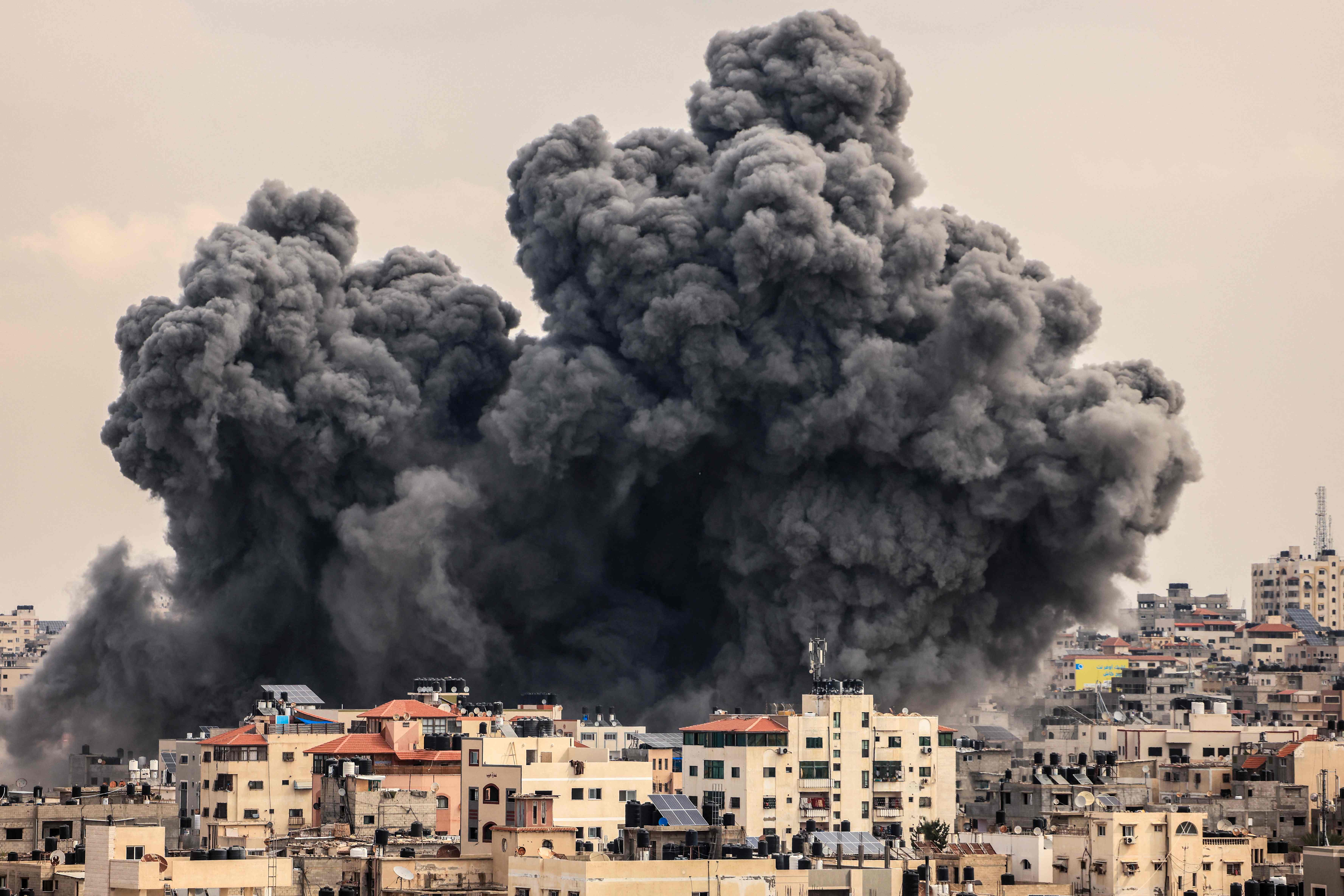Gaza’s tsunami of violence has emboldened Israel’s enemies – and could engulf the Middle East
Syrian troops massing on the border. Iran blamed for backing the invasion. The possibility of all-out war with Lebanon… Mark Almond on the bloody fall-out triggered by Hamas


The horrors unleashed by Hamas’ murderous rampage in Israel grip our attention. As the Israeli armed forces seek to eliminate the threat of new attacks with massive firepower, the bloody Gaza cockpit risks fascinating us so much that we don’t look where this tsunami of violence could spread next.
Already, Israel’s forces are massing on its border with Lebanon to repel, maybe pre-empt, a sympathy strike by Hamas’s ally, Hezbollah, there. This could presage an all-out war between Israel and Lebanon of the sort not seen since 2006. Then, Hezbollah was the only Arab army to fight Israel to a draw since 1948.
Syrian troops are massing on their border with Israel. Maybe the dramatic success of Hamas’ initial attack will embolden Israel’s enemies to her north to join in the fight.
Even if that happens, it would still be just a vicious local war. But already, many Israeli and Western analysts are blaming Iran for training, equipping and planning Saturday’s mayhem; Hamas spokesmen have thanked the Islamic Republic for its help. Like Hamas, Iran doesn’t just ask for Israel to leave the territories occupied since 1967, it denies Israel’s right to exist and prays for its destruction.
Israel has been fighting a kind of proxy war by bombing Iranian forces in Syria helping Bashar al-Assad, but also supplying Hezbollah with the kind of rockets that Tehran has spent years and billions developing.
Iran has used Hamas as the wrecking ball for the peace deals that Donald Trump sponsored between Israel and key Muslim states, such as the United Arab Emirates, in 2019. Joe Biden was hoping to go one better and get Saudi Arabia to join these so-called “Abraham Accords”, giving him a diplomatic triumph to neutralise Trump’s one big achievement in the coming US elections.
Now, Saudi Arabia’s ruling crown prince, Mohammed bin Salman, has backed off from recognising Israel. This seems to be an admission that Saudi’s youthful population is virulently anti-Israeli, by all accounts.
Arab leaders are aware of the risks of recognising the Jewish state. The Egyptian president Anwar Sadat went from being the hero of the Yom Kippur War in October 1973, to being gunned down in 1981 by his own soldiers for making peace with Israel. Now, the social pressures of a very young, alienated, growing generation that led to the Arab Spring uprisings in 2011 are still simmering close to the surface.
Egypt’s dictator, president Abdel Fattah el-Sisi, is facing what should be a shoo-in re-election in December. But, even before one of his policemen murdered two Israeli tourists yesterday, unrest has beset Egyptian cities.
If the effect of Israeli bombs and Benjamin Netanyahu’s urging of Gaza’s inhabitants to “leave for their own safety” causes a human wave to surge across the border into Egypt, the country’s stability could buckle.
Egypt has been vital to the West ever since the opening of the Suez Canal in 1869. Anything that blocks it disrupts world trade dramatically. Think back to the Ever Given wedged across it in March 2021, but with a war raging around it.
We haven’t seen the huge spike in the oil price like the one resulting from the Yom Kippur War 50 years ago – yet. Oil-producing Iran and Russia would happily see us tipped into recession by a surge in energy costs.
Israel’s new unity government could strike at Iran as the godfather of its terrorist threats but also as the only other Middle Eastern military industrial complex already producing missiles which can carry a nuclear warhead. Iran’s drones are already spreading “conventional” mayhem for Vladimir Putin in Ukraine. Mr Netanyahu has been warning for years that Israel would never let Iran get the bomb.
The West is not safely remote from the consequences of a spreading war. Remember, October 1973 saw not only the oil price shock, but the Americans and the Soviet Union came close to shooting at each other as the Kremlin threatened to send troops to aid Egypt and President Nixon put his forces worldwide on alert.
If Putin is tempted to meddle directly, the world could be back at that cliff-edge. Russia and Iran are de facto allies, after all. Even without that, Hamas and Iran could try to stir up domestic terrorism via Islamist extremists in Western countries.
America faces another ghost of the 1970s: a hostage crisis. Hamas holds US dual-citizens among its scores of hostages. Biden faces going into an election year with the same hostage albatross around his neck that destroyed Jimmy Carter’s chances of re-election in 1980. Will he risk a rescue attempt that could go down in flames like Carter’s?
The West’s economic security, in many ways, is now a hostage to decisions made by political leaders out of our control. Israel isn’t America’s puppet, and Iran, Russia and groups like Hamas and Hezbollah might think the more chaos affecting us, the better for them. Is an aged Biden really up to managing a global crisis?
Mark Almond is a foreign policy analyst and director of the Crisis Research Institute, Oxford







Join our commenting forum
Join thought-provoking conversations, follow other Independent readers and see their replies
Comments